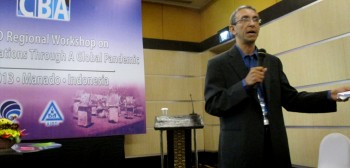Over 30 participants representing broadcasters across Asia took part in a workshop to prepare broadcasters in the event of a pandemic. The workshop was a pre-summit event for the Asia Media Summit, taking place in a week where the new bird flu virus and coronavirus continue to make headlines.
Delegates from Hong Kong, Pakistan, Indonesia, India, and the Philippines shared their experiences with disease outbreaks and other disasters at CBA’s event: Be Prepared! Managing Your Organisation Through a Global Pandemic.
The workshop was praised for engaging with a topic that many hadn’t seriously considered previously, despite its pertinence. One of the speakers, Nalaka Gunwardene, a Sri Lankan science writer and director of TVE Asia Pacific tweeted: “Revealing: In a room of 30+ broadcast reps from across Asia, only 1 says his stn (NDTV) has an internal disaster response plan.” Although this could also suggest that some broadcasters have plans, but not all of their staff may be aware of them.
Therefore it was also a case of discussing where a network would begin with a strategy on broadcasting during a disaster. ‘Business Continuity Planning’ was highlighted as essential for broadcasters. Planning for disaster seemed a daunting task for many in the room. Dr Goh Moh Heng, one of the speakers, and President of the BCM Institute in Singapore, suggested starting small, creating a plan for how to broadcast when staff did not have access to their offices, for instance.
The four speakers led discussions on media ethics in the event of pandemics. Dr Mike McCluskey, former CEO of Radio Australia posed the question: “Providing information to save lives is essential, but over-telling of pandemic tragedies can add to the trauma in people’s lives, how do we provide the right balance?”
Dr Graham Tallis, from the World Health Organization, discussed bridging the gap between the media and public health experts, and cited a number of practical initiatives, such as regular WHO meetings with the media, appointing spokespeople in health sectors. He also suggested that the health sector needed to be up to date with social and mobile media and use it proactively to disseminate health messages and counter misinformation.
Broadcasters at the event also expressed an appetite to engage more with the WHO over pandemic preparedness.
Trust was also highlighted as a key factor for broadcasters in fulfilling their role in a crisis. And that trust is developed over time through broadcasters being consistently accurate, reliable and involved in communicating disaster-related information, even when a disaster isn’t occurring.
The event also coincided appropriately with a week of 10-year commemoration events taking place to remember those who died from Sars, and its impact.
See also:
Images from the workshop on Flickr
Nalaka Gunwardene’s blog post on communication and pandemics, and workshop reflections
Nalaka Gunwardene’s column, Public trust in times of global pandemics, in Ceylon Today
View the speakers’ presentations below:
Top image: Nalaka Gunwardene

 WorldView
WorldView Your WorldView
Your WorldView
